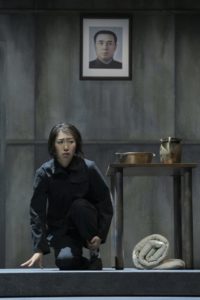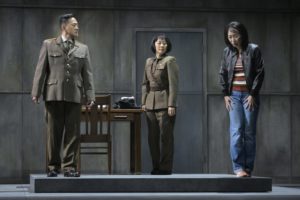A TINY DROP
Given the storyline, it’s remarkable how the urgency is more than diluted in The Great Wave, Francis Turnly’s play about a teenage Japanese girl who disappears one night when she is presumably washed out to sea by an enormous wave. Sadly, Mr. Turnly compounds his story with hackneyed dialogue, American vernacular (“my old man”) and short scenes which seem to keep interrupting each other. The American Premiere at Berkeley Rep isn’t helped by Mark Wing-Davey’s plodding, tiny direction and sluggish scene changes, and some of the acting is actually bad, as if financial, physical, and intellectual backgrounds — not to mention motivation — doesn’t even exist for some. What could of caused this at such a prestigious company?
 Spanning 1979 to 2003, the endlessly fascinating tale is Turnly’s way of humanizing the true-life kidnappings of Japanese by the Korean government, which used victims to teach spies how to act in Japan when on fact-gathering missions. For a long time, these abductions were denied by North Korea and its sympathizers and were often considered a conspiracy theory. Despite pressure from Japanese parent groups, the Japanese government took no action. We watch as the mother Etsuko (Sharon Omi) and her daughter Reiko (Yurié Collins) — both of whom believe Reiko’s sister, Hanako (Jo Mei), is still alive — stand up to an ambassador (Paul Nakauchi) and a police detective (David Shih), who initially suspects a teenage boy Tetsuo (Julian Cihi) for Reiko’s disappearance, as he is the one who invited her to join him on the sea wall. (Just to show you how incongruous the evening felt: At one point, Reiko smashes the official’s Bonsai tree on the ground, and he just happens to have a large dustpan and brush in his desk to clean up the mess!) The most interesting aspect of the show is the espionage training in Korea, and Hanako’s survival there.
Spanning 1979 to 2003, the endlessly fascinating tale is Turnly’s way of humanizing the true-life kidnappings of Japanese by the Korean government, which used victims to teach spies how to act in Japan when on fact-gathering missions. For a long time, these abductions were denied by North Korea and its sympathizers and were often considered a conspiracy theory. Despite pressure from Japanese parent groups, the Japanese government took no action. We watch as the mother Etsuko (Sharon Omi) and her daughter Reiko (Yurié Collins) — both of whom believe Reiko’s sister, Hanako (Jo Mei), is still alive — stand up to an ambassador (Paul Nakauchi) and a police detective (David Shih), who initially suspects a teenage boy Tetsuo (Julian Cihi) for Reiko’s disappearance, as he is the one who invited her to join him on the sea wall. (Just to show you how incongruous the evening felt: At one point, Reiko smashes the official’s Bonsai tree on the ground, and he just happens to have a large dustpan and brush in his desk to clean up the mess!) The most interesting aspect of the show is the espionage training in Korea, and Hanako’s survival there.
Even with video designer Tara Knight’s drowning imagery of cascading bubbles, the waves look somehow fake, and set designer Chika Shimizu’s playing areas which glide in and out (a prison cell; a bedroom) feel remarkably small for such a large theater. With all of the relentless facts and figures, it seems that Turnly is going for agit-prop, but if we don’t believe the play, it’s not going to have any effect — except the need to consume a great wave of coffee at intermission.
photos by Kevin Berne/Berkeley Repertory Theatre
The Great Wave
Berkeley Rep
Berkeley Repertory Theatre’s Roda Theatre
2015 Addison Street @ Shattuck
ends on October 27, 2019
for tickets, call 510.647.2949 or visit Berkeley Rep




{ 1 comment… read it below or add one }
Although you’re right that there were some flaws in The Great Wave, you seem to have missed the powerful analogy of the play. We in the United States live in that country: where our dear leader’s cruelty is accepted and the brutal separation of mothers from their children, in the name of national security, is an everyday occurrence. There is a reason a carved wooden sign saying “Welcome†was a significant gift to a foreign émigré in the last act. The suffering of family separation is central to this play and it was profoundly portrayed. The day I saw the play, the audience felt this message and many people were weeping. There was a standing ovation. I don’t know why reviewers value glib artsiness over a call to recognize the historic moment we are in.